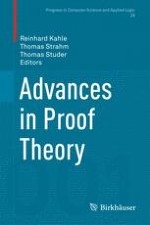2016 | OriginalPaper | Buchkapitel
Lindenbaum’s Lemma via Open Induction
verfasst von : Francesco Ciraulo, Davide Rinaldi, Peter Schuster
Erschienen in: Advances in Proof Theory
Aktivieren Sie unsere intelligente Suche, um passende Fachinhalte oder Patente zu finden.
Wählen Sie Textabschnitte aus um mit Künstlicher Intelligenz passenden Patente zu finden. powered by
Markieren Sie Textabschnitte, um KI-gestützt weitere passende Inhalte zu finden. powered by
